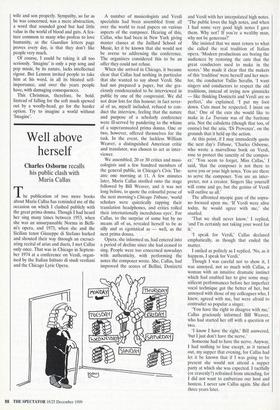Well above herself
Charles Osborne recalls his public clash with Maria Callas The publication of two more books about Maria Callas has reminded me of the occasion on which I clashed publicly with the great prima donna. Though I had heard her sing many times between 1953, when she was an unsurpassable Norma in Belli- ni's opera, and 1973, when she and the Sicilian tenor Giuseppe di Stefano barked and shouted their way through an excruci- ating recital of arias and duets, I met Callas only once. That was in Chicago in Septem- ber 1974 at a conference on Verdi, organ- ised by the Italian Istituto di studi verdiani and the Chicago Lyric Opera.
A number of musicologists and Verdi specialists had been assembled from all over the world to read papers on various aspects of the composer. Hearing of this, Callas, who had been in New York giving master classes at the Juillard School of Music, let it be known that she would not be averse to addressing the conference. The organisers considered this to be an offer they could not refuse.
When she arrived in Chicago, it became clear that Callas had nothing in particular that she wanted to say about Verdi. She had not prepared a paper, but she gra- ciously condescended to be interviewed in public by one of the congressisti. We did not draw lots for this honour; in fact sever- al of us, myself included, refused to con- duct the interview, feeling that the nature and purpose of a scholarly conference were ill-served by pandering to the whims of a superannuated prima donna. One or two, however, offered themselves for the task. In the event, the luckless William Weaver, a distinguished American critic and translator, was chosen to act as inter- viewer.
We assembled, 20 or 30 critics and musi- cologists and a few hundred members of the general public, in Chicago's Civic The- atre one morning at 11. A few minutes later, Maria Callas strolled onto the stage followed by Bill Weaver, and it was not long before, to quote the colourful prose of the next morning's Chicago Tribune, 'world scholars were quizzically tapping their translation headphones, and critics rolled their internationally incredulous eyes'. For Callas, to the surprise of some but by no means all of us, revealed herself to be as silly and as egotistical as — well, as the next prima donna.
Opera, she informed us, had entered into a period of decline since she had ceased to sing. People were too concerned nowadays with authenticity, with performing the notes the composer wrote. She, Callas, had improved the scores of Bellini, Donizetti and Verdi with her interpolated high notes. 'The public loves the high notes, and when I had some very good high notes I gave them. Why not? If you're a wealthy man, why not be generous?'
She insisted that we must return to what she called the real tradition of Italian opera. 'Modern productions are boring the audiences by restoring the cuts that the great conductors used to make in the scores.' She made it clear that the makers of this 'tradition' were herself and her men- tor, the conductor Tullio Serafin. 'I want singers and conductors to respect the old traditions, instead of trying new gimmicks — like thinking Donizetti and Verdi are so perfect,' she explained. 'I put my foot down. Cuts must be respected. I insist on that.' One of the cuts she would like to make in La Traviata was of the baritone aria. Not the cabaletta (though that too, of course) but the aria, 'Di Provenza', on the grounds that it held up the action.
At this point, if I may immodestly quote the next day's Thbune, 'Charles Osborne, who wrote a marvellous book on Verdi, rose to protect the sanctity of the compos- er.' You seem to forget, Miss Callas,' I said, 'that the composer is not there to serve you or your high notes. You are there to serve the composer. You are an inter- preter, not a creator. Singers like yourself will come and go, but the genius of Verdi will outlive us all.'
The affronted myopic gaze of the sopra- no focused upon me. 'If Verdi were alive today, he would agree with me,' she snarled.
'That we shall never know,' I replied, 'and I'm certainly not taking your word for it.'
'I speak for Verdi,' Callas declared emphatically, as though that ended the matter.
I smiled as politely as I replied, `No, as it happens, I speak for Verdi.'
Though I was careful not to show it, I was annoyed, not so much with Callas, a woman with an intuitive dramatic instinct which had enabled her to give some mag- nificent performances before her imperfect vocal technique got the better of her, but annoyed with those of my colleagues who, I knew, agreed with me, but were afraid to contradict so popular a singer.
'You have the right to disagree with me,' Callas graciously informed Bill Weaver, who had started her off with a question or two.
'I know I have the right,' Bill answered, 'but I just don't have the nerve.'
Someone had to have the nerve. Anyway, I had nothing to lose except, as it turned out, my supper that evening, for Callas had let it be known that if I was going to be present she would not attend a supper party at which she was expected. I tactfully (or cravenly?) refrained from attending, for I did not want to embarrass our host and hostess. I never saw Callas again. She died three years later.






















































































































 Previous page
Previous page